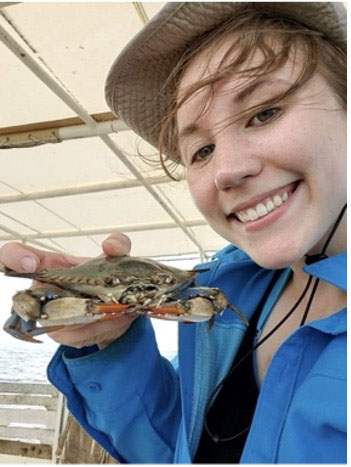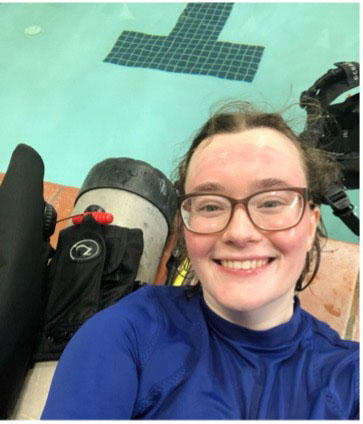Marine Fisheries Internships Pave Way for Future USM Scientists
Mon, 06/24/2024 - 12:55pm | By: Gabriela Shinskie
A collaborative effort between The University of Southern Mississippi (USM) and the Science Center for Marine Fisheries (SCEMFIS) provides significant research opportunities that benefit the Mississippi Gulf Coast’s blue economy. Student internships represent one reward from the impactful partnership.
Molly Spencer and Catherine Wilhelm - USM graduate students in the School of Ocean Science and Engineering (SOSE) - were paired with the National Science Foundation (NSF) Internship Program that prepares the next generation of fisheries scientists in response to climate change, the blue economy, and coastal impacts.

Spencer’s research work with the program focused on the effects of climate-inducing warming on commercial imports such as Atlantic surfclam and ocean quahog in the Mid-Atlantic Bight. Analyzing the effects of increasing temperatures on habitats has sparked her passion for fisheries at the Northeast Fisheries Science Center (NEFSC) in Woods Hole, Mass.
"The internship with NEFSC gave me a greater sense of just how important it is for scientists and industry partners to work together,” Spencer said. “Lots of changes are occurring in our oceans right now, and I’m fortunate to have had the opportunity to participate in research that was both scientifically rewarding as well as impactful to the coastal community.”
SCEMFIS seeks to unite industry, government, and academics to support research in the fisheries industry along with undergraduate and graduate internships. These opportunities welcome a collaborative environment for scientists to network and lead future fisheries projects.
Dr. Eric Powell, director of SCEMFIS and a USM Coastal Sciences faculty member, said the future of science must include students involved in research as often as possible.
“Our interns have contributed to some of the most important recent work done by the Center, and the Center has served as a great launching point for many scientific careers,” said Dr. Powell.
The mission of the center also involves support for careers and opportunities for hands-on experiences benefiting the blue economy. Students also have opportunities to have their research published and find jobs in marine science.

Wilhelm was awarded an NSF Non-Academic Internship to work with Omega Protein Corporation and conduct research for the Gulf of Mexico menhaden purse seine fishery. She worked under the supervision of Dr. Robert Leaf, interim director for the SOSE.
Wilhelm’s contributions helped develop an internet-based data portal to gather fishery-independent data from the Gulf states in a sustainable way to improve management and understanding of the Gulf’s menhaden resource. Wilhelm’s efforts have landed her a position at the Virginia Marine Resources Commission as a data analyst.
“Working with the fishing industry was such an amazing experience for me,” stated Wilhelm. “Coming from the academic side of research, it was incredibly eye opening and integral to be able to learn about and understand the human side of fishery ecology. It worked out so well as the graduate school was close the fishery plants and business locations.”
“Catherine played a critical part in the development of the data portal’s index of relative abundance which was necessary to assess Gulf menhaden resource condition in relation to an index-based reference point developed for Gulf menhaden,” said Dr. Leaf.
Added Spencer, “It’s one thing to learn about these science techniques and theories in class, but it's a completely different experience when using these skills in practice.”
Learn more about SCEMFIS and SOSE along with continued efforts to provide first-class internship opportunities and training future scientists.